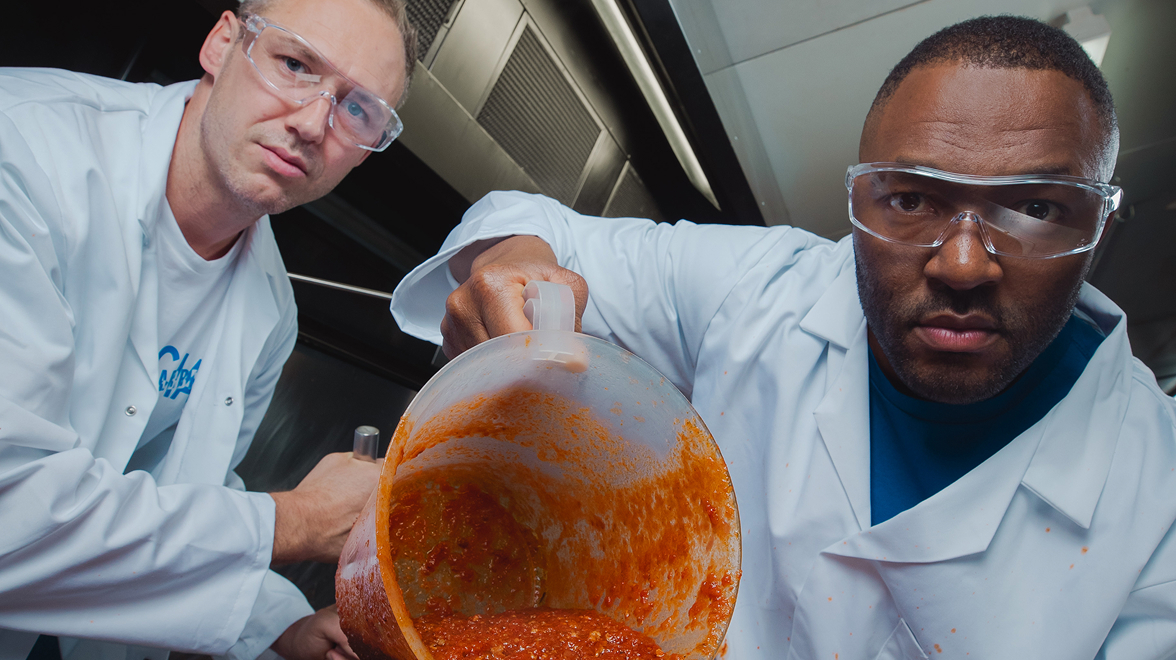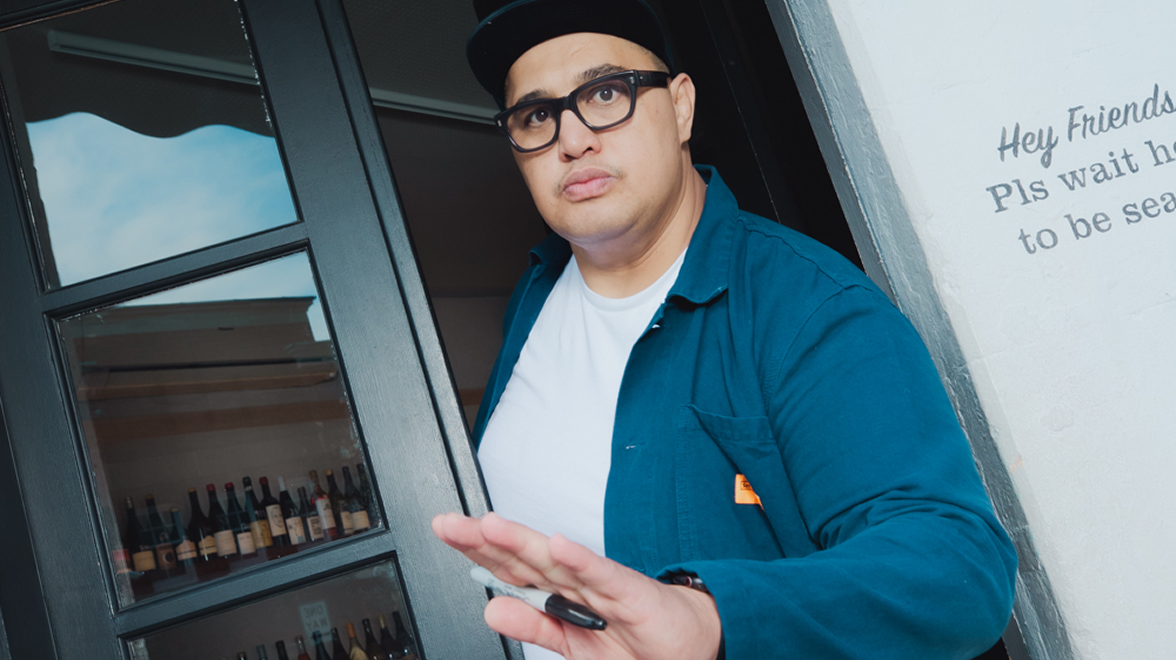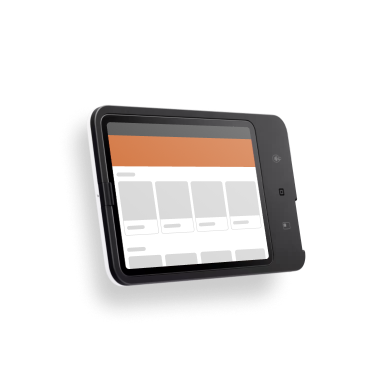Please update your browser.
Download the latest version of a supported browser below to get the most out of this website:

About this seller
CHAE is an intimate, home-based Korean dining experience located near Melbourne. They serve only six guests per session, but they’ve grown so popular that the waiting list is in the thousands. Co-owners Chae and Yoora talk about how small restaurants can attract a large following.

Husband-and-wife team Yoora Yoon and Jung Eun Chae.
Dive deeper into CHAE’s home-dining phenomenon
Unique business model, unique challenges
Your restaurant model is quite distinctive – limited to six guests per sitting, four sittings per week. Can you walk us through the thinking behind this approach and how it's evolved?
When I first started this concept restaurant from a small two-bedroom apartment in Brunswick, I experimented with various guest numbers before settling on six. This intimate group size allows me to give each guest personalised attention and deliver a truly tailored experience. Given the unique nature of our business and the intricacies of fermentation, a significant amount of time is dedicated to preparation and maintaining the venue. With just the two of us running everything, we made the conscious decision to open exclusively on weekends, reserving weekdays for the behind-the-scenes work that ensures the quality and authenticity of every meal we serve.
Can you walk us through a typical week at CHAE?
Monday is our day off, but from Tuesday to Thursday, Yoora spends his mornings in the office answering email enquiries, handling paperwork, and creating social media content. After lunch, he focuses on house projects, currently working on our garden with the aim of opening it up for guests to explore. This will give them a chance to see our homegrown produce and condiments before service begins. Meanwhile, I dedicate most of my day to the kitchen, replenishing condiments, cleaning, researching and experimenting with new menu ideas. On Fridays, we begin prepping for the weekend service. Our seafood order arrives, Yoora goes grocery shopping and I start ingredient prep. Together, we clean the house to get everything ready for the weekend. Saturdays and Sundays are service days. In the morning, Yoora sweeps the driveway to ensure it’s clear of fallen leaves, while I continue prepping and start cooking the ingredients prepared the day before. Guests begin arriving at 1:00 pm for lunch service, which lasts about two hours. During this time, Yoora takes Haru, our black Labrador, for a walk. Once the guests leave around 3:00 pm, we have a quick bite, clean the kitchen and dining area, and prepare for the dinner service at 6:00 pm.
For those considering starting a home-based restaurant, what are the key regulatory considerations they should be aware of?
It is important to conduct thorough regulatory research and consult with your local council to ensure your home-based food business complies with all relevant requirements before starting operations. There are often rules you may not be aware of. For example, beyond the regulatory standards for operating an unconventional venue, if you plan to serve food that involves non-traditional preparation methods – such as fermentation or raw meat – you will need a separate food safety program. This program must be independently audited annually in addition to the standard council inspections.
How CHAE’s loyal guests go the extra mile
Being located an hour's drive from Melbourne means your guests come on a journey to join you. Can you tell me a bit more about how this plays into the overall experience you’ve crafted?
I truly appreciate the effort our guests make, travelling long distances, sometimes even from interstate, to dine at CHAE. It’s incredibly humbling and adds a sense of excitement and anticipation to their journey, which can also feel like added pressure on our end to deliver an exceptional experience. At the same time, I love that it provides an opportunity for our guests to step away from their busy daily lives, enjoy a peaceful road trip into the mountains, and embrace a change of scenery.
You've created an experience that prioritises connection, even reserving Sunday dinners for VIP guests who have dined 3+ times. How does this focus on community impact your business?
With our ballot system for reservations, we deeply understand the effort it takes to dine with us, let alone three times. Offering a Sunday dinner to guests who’ve visited us more than three times is our heartfelt way of expressing gratitude for their unwavering support and interest. Guests who join us more than three times become VIPs, earning the opportunity to book a private Sunday dinner once a year for up to six guests. If a VIP books for fewer than six people, we fill any remaining seats by prioritising lottery participants who’ve waited the longest – sometimes even for years – ensuring fairness and rewarding patience. Building close relationships with our regular customers allows us to foster meaningful connections and create a sense of community. It’s an incredible privilege to witness their lives evolve over time, sharing in their milestones, celebrations and journeys.

Small risks, big following
How has maintaining this intimate model, despite growth opportunities, benefited your business? What lessons could other restaurateurs learn from this approach?
Our intimate business model may not generate significant financial returns, but it also carries a lower level of risk if things don’t go as planned. It’s a case of small investment, small return. However, we see it as an ideal platform to tap into a niche market and build strong, personal connections with our audience. Our focus is on attracting individuals who share our values and appreciation for what we do, rather than appealing to the masses. In today’s business environment, advanced internet and AI technologies have transformed how people discover and engage with brands. Algorithms now segment audiences into highly specific interest groups, tailoring content and recommendations to individual preferences. This shift makes it more effective for businesses like ours to focus on creating a meaningful connection with a niche audience that genuinely appreciates our values and offerings, rather than casting a wide net for a broader, less engaged crowd. By prioritising depth over breadth, we can foster stronger relationships and ensure our efforts resonate with those who truly value what we do.
Our intimate business model may not generate significant financial returns, but it also carries a lower level of risk if things don’t go as planned. It’s a case of small investment, small return.
Another growing revenue stream – and how Square helps
Can you tell us about some of the unique elements you've developed to set CHAE apart, like your homemade condiments?
Beyond the well-known aspects of our restaurant, such as the home-based venue and six-seat setup, one of the most distinctive elements we’ve developed is our range of homemade traditional condiments. These are crafted entirely from scratch using time-honoured techniques and recipes. The process requires constant labour and significant space to store the condiments in traditional clay jars for fermentation and aging, often for years. This practice is virtually unheard of in conventional Australian restaurants, as it demands substantial manpower and resources without yielding immediate returns, making it commercially unviable. Even in Korea, such a setup is exceptionally rare.
As you look to the future and potential expansion, how do you plan to balance growth with maintaining your core concept?
Our business concept is deeply rooted in a clear, strong identity that people genuinely appreciate, which makes it challenging to scale up in the traditional sense. We have no plans to expand our dining experience beyond its current scale. However, after five years of operation, we’ve identified a niche market for traditionally crafted Korean condiments – a segment we believe holds significant potential for growth in the retail space.
We’ve been slowly working on trialling this as a product offering, having a selection of condiments available for guests to purchase after they dine with us, as well as bringing products for sale to all the kitchen pop-ups and markets we’ve partnered with this year.
Having the Square Terminal to bring along with us has been amazing. Being able to take payments directly to our account no matter whether we’re at home, popping up in restaurants across the country or holding fort at our local markets has made bringing this retail offering dream to life, so much easier.
CHAE is a proud Square seller.
Square tools that help CHAE grow
To learn more about how these tools can help your business, please contact our team of experts.
More from In Service
Brand & Design
Tech
Tom Mark Henry
Tom Mark Henry is an award-winning design studio with offices in Sydney and Brisbane. They create inspiring spaces that optimise the function of restaurants. Director Cushla shares insights on how restaurants can work with interior designers to get the best results.

Adding Retail
Growth
Restaurant
Fabbrica
Fabbrica was born as a retail line of pasta kits that are easy to make at home. The business has grown into several dine-in pasta bars and delis throughout Sydney. Head Chef Scott and General Manager Marlon share thoughts on how a restaurant can diversify its revenue.

Growth
Operations
Bar
Bar Copains
Bar Copains in Sydney offers a curated selection of wine plus a menu that complements each pour. Co-owner Morgan and his team create their vision with a laser-focus on the details. Morgan talks about the mindset that helps venues attract guests night after night.

This content is for informational purposes only and does not constitute professional advice. For specific advice applicable to your business, please contact a professional.










